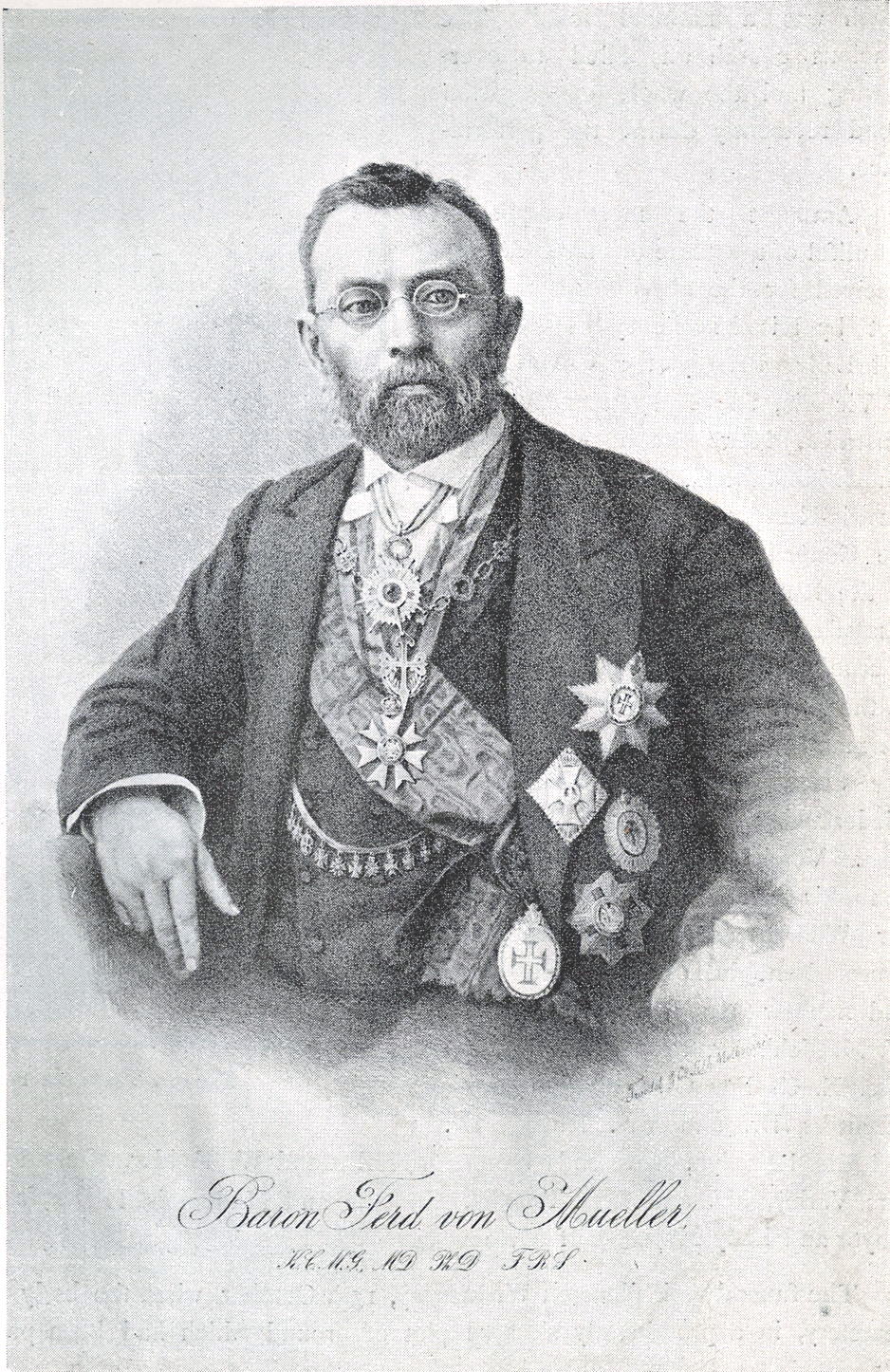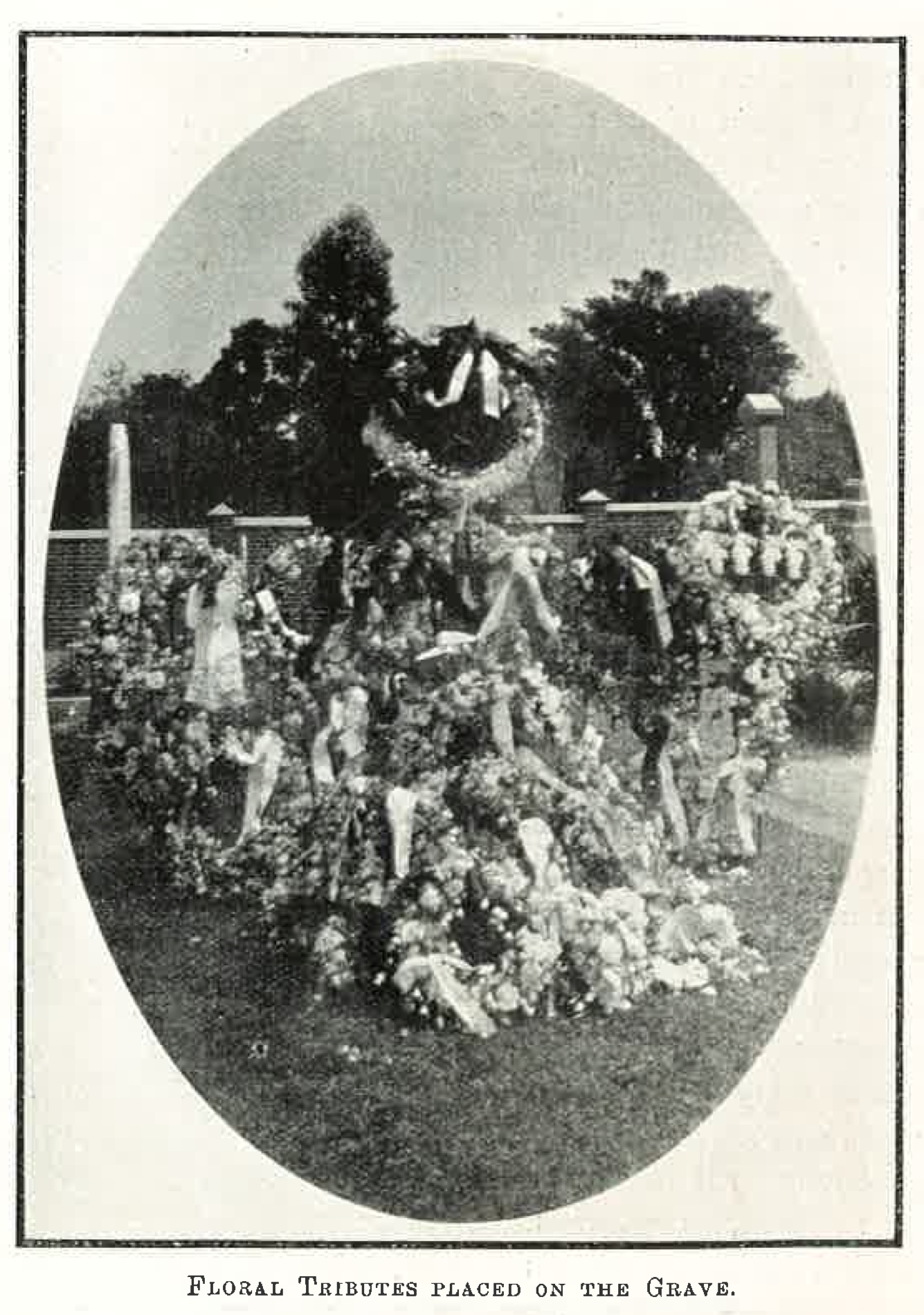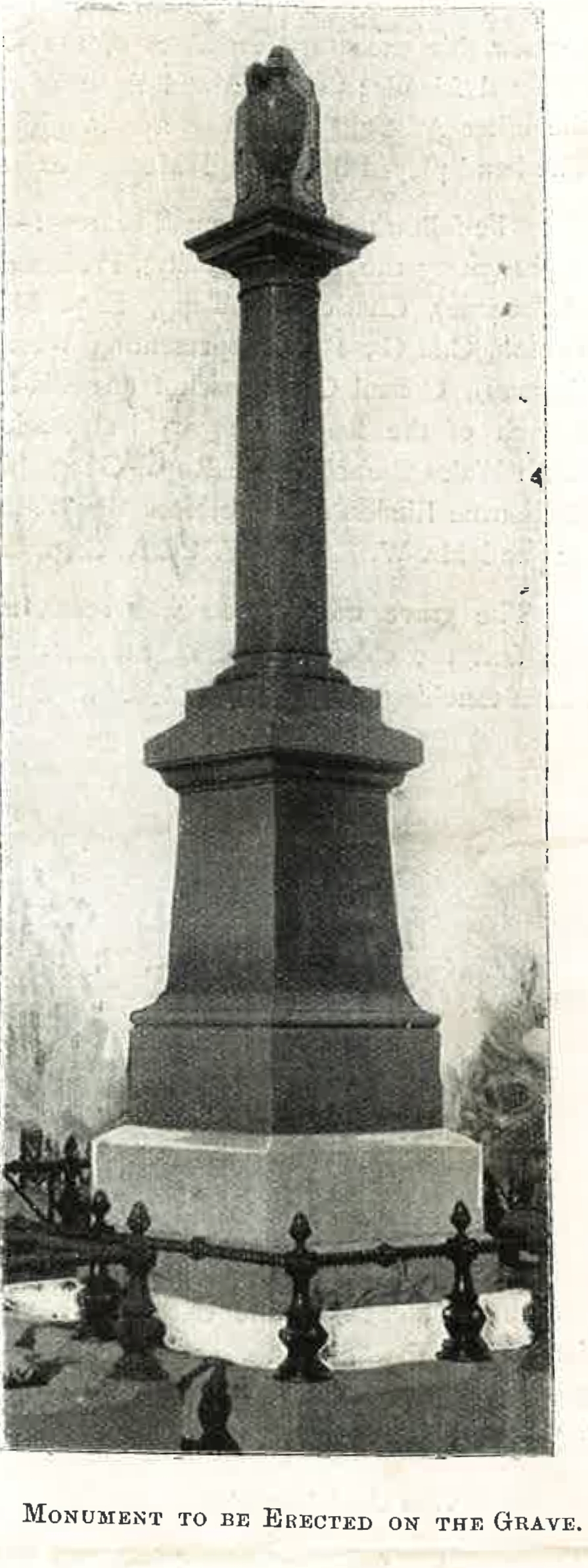Document information
Physical location:
M97.00.00Preferred Citation:
William Potter to the general public, 1897 [M97.00.00]. R.W. Home, Thomas A. Darragh, A.M. Lucas, Sara Maroske, D.M. Sinkora, J.H. Voigt and Monika Wells (eds), Correspondence of Ferdinand von Mueller, <https://vmcp.rbg.vic.gov.au/id/M97-00-00>, accessed September 10, 2025
1
Text is a four-page pamphlet, each page black-edged, published by Alex M'Kinley & Co., Printers, Melbourne, n.d. There are three illustrations on, respectively, the first, second and fourth pages. The monument erected closely
followed that depicted on p. 4.  ,
,
 ,
, 
 ,
,
 ,
, 
"Blessed are the pure in heart: for they shall see God." — Matt. V. 8.
BARON SIR FERDINAND VON MUELLER,
K.C.M.G., M.D., F.R.S., &c., Government Botanist of Victoria.
Born at Rostock, Germany, 30th June, 1825. Died at South Yarra, Victoria, 10th October,
1896.
The death of Baron Sir Ferdinand von Mueller has bereft Victoria of its most illustrious
citizen, Australia of its most distinguished geographer, and the Scientific world
of one of the most erudite, industrious, open-handed, pure-hearted and lovable phytologists
the present century has produced. The dominant wish expressed by the deceased
savant
of late years was, that he might be privileged to die in harness as Government Botanist,
and the knowledge that his wish was gratified somewhat mitigates the sadness of the
event. Although not in good health he continued to discharge his official duties until
seized with brain paralysis, brought on by official worry and overwork, when, after a brief illness, he peacefully "fell asleep," at his residence, Arnold-street, South
Yarra, at 20 minutes past one o'clock on the morning of Saturday, 10th October, 1896.
The news of his unexpected death evoked expressions of deep sorrow from every section
of the public Press, and his Executors (Rev. W. Potter, F.R.G.S., Alexander Büttner, M.D., F.R.C.S., etc., and Hermann Büttner, Esq.) received telegrams
and floral tributes from the Governments and the Learned Societies of all the Australian
Colonies, from the Consuls of several Foreign Powers, and from a large body of representative
citizens — showing the esteem in which his many virtues and high scientific attainments
were held.
On Sunday (11th October) reference was made in many of the Melbourne churches to the
loss the community had sustained by Sir Ferdinand's demise. At the close of the evening
service in the Australian Church, the Rev. Charles Strong, D.D., announced that, by
request, "the organist would play the 'Dead March,' as a tribute to the memory of
the late Baron von Mueller, a gentleman who, by his high attainments, had added largely
to the scientific knowledge of the world. His life had been stainless, and he was
now at rest. His death was a national loss."
The spacious church was filled to over-flowing, and the whole congregation stood reverently
during the performance.
Amongst the most exquisitely beautiful of the numerous floral devices received for
the obsequies were those sent by His Excellency the Governor and Lady Brassey, the
Governments of Victoria, South Australia, Western Australia, New South Wales and Queensland,
the Consuls for Germany, Austria-Hungary, France and Denmark, the Council of the Victorian
Branch of the Royal Geographical Society of Australasia, the Director of the Melbourne Botanical Gardens, the Director of the Sydney Botanical Gardens, the German Club, the Melbourne University Science Club, the Melbourne Liedertafel, the Melbourne,
Deutscher Turn Verein, the Field Naturalists Club, Sir Arthur and Lady Snowden, Sir
William and Lady Clarke, the deceased nobleman's widowed sister and nephew (Mrs. Dr.
Wehl and Mr. W. M. Wehl, South Australia), Mr. and Mrs. E. G. Fitz Gibbon, the Baron's executors, Dr. and Mrs. Rudall, Dr. and
Mrs. Lewellyn,
Reverends Hermann Herlitz and W. Fielder, Mrs. and Miss Ward Cole, Miss J. Law, Mrs.
Varley, Mr. and Mrs. Troedel, Madame and Mademoiselle Dreyfus, and the Right Worshipful
the Mayor and Lady Mayoress of Melbourne.
2
punctuation in source text.
3
A. J. R. Lewellin.
The funeral took place on Wednesday, 13th October, when the body was interred in the St. Kilda Cemetery, in a prominently situated plot of ground which had been presented
to the Baron by the Trustees only a few days before the attack of his fatal illness.
The cortége was solemnly imposing. Preceding the hearse were the band and members
of the Deutscher Turn Verein, carrying the banner of the society, of which the deceased
was a member. Both hearse and floral car were heavily laden with floral tributes.
The coaches for the chief mourners came next, in which were seated the late Sir Ferdinand's
nephew, his executors, members of the Council of the Geographical Society, and some
of his oldest personal friends: then followed the coaches occupied by representatives
sent by the Cabinet of this and of the other Australian colonies, and in addition
to these a long line of private carriages and other vehicles. The band played the
"Dead March"
en route
to the cemetery and also at the grave.
The following were the pall-bearers: — Professor Sir Frederick M'Coy, K.C.M.G., M.A.,
D.Sc., F.R.S. (representing the Royal Society), Professor William C. Kernot, M.A.,
C.E. (representing the University of Melbourne), Charles A. Topp, Esq., M.A. (representing
the Government of Victoria), Joseph A. Panton, C.M.G., P.M. (representing Western
Australian Government), Consul W. A. Brahe (Imperial German), Consul Carl Pinschof
(Austria-Hungary), Hon. A. O. Sachse, M.L.C. (representing Victorian Branch of the
Royal Geographical Society of Australasia), Capt. F. B. Gipps, C.E. (representing New South Wales Branch of the Royal Geographical Society
of Australasia), J. M. Bruce, Esq. (President of the Melbourne Liedertafel), the Hon.
Sir William Clarke, Bart., M.L.C., Alexander Büttner, M.D., F.R.C.S., etc., and Mr.
W. Rudall, F.R.C.S., Eng., (representing oldest private friends).
The grave was bedded with roses, and around it was a raised platform for the officiating
clergyman and the chief mourners. Standing near the bier, the members of the Melbourne
Liedertafel gave a most touching rendering of the beautiful part song (Fr. Abt, "Evening"):
—
Day again his race has run,
And the tranquil night comes on,
Soothingly her pinion is waving,
Heated hill and valley laving,
Spreading from her starry chart
Holy peace to every dwelling,
Holy peace to every heart.
Followed by the "Hymn to Night" (Beethoven): —
Holy night, O soothe my breast
With thy solemn tranquil calm;
Give the weary wanderer rest,
O'er his sorrows shed thy balm.
Stars brightly o'er me gleaming,
From azure fields are dreaming;
They set my soul a-dreaming
Of rest above.
The Rev. Hermann Herlitz read the burial service, and delivered an impressive address,
expatiating upon the nobleness of the deceased botanist's life, the absorption of
mind and energy in his beloved science and its cognate sciences, his sympathy with
the distressed, and his unbounded generosity. After which the requiem (Beethoven,
arr. by Mr. J. King) was rendered with great sweetness by the Liedertafel —
|
Now the labourer's task is o'er,
Now the battle day is past;
Now upon the farther shore,
Lands the voyager at last.
Father, in Thy gracious keeping
Leave we now Thy servant sleeping.
|
|
There the tears of earth are dried,
There its hidden things are clear;
There the work of life is tried
By a juster Judge than here.
Father, in Thy gracious keeping
Leave we now Thy servant sleeping.
|
|
"Earth to earth and dust to dust:"
Calmly now the words we say,
Leaving him to sleep in trust
Till the resurrection day.
Father, in Thy gracious keeping
Leave we now Thy servant sleeping. —
Amen
.
|
||
In his address at the Annual Commencement (1897) of the University of Melbourne, the
Chancellor (Sir Anthony Brownless K.C.M.G., M.D.) said: "When speaking of science I cannot refrain from paying a tribute of respect
to the memory and to the great talents of my late dear old friend, the Baron Sir Ferdinand
von Mueller, whose fame as one of the greatest of Scientific Botanists of the present
age was world-wide. Whilst the benefits which he conferred on the Australian colonies
by the dissemination of the most practical information to agriculturists and others
ought to cause him to be remembered with the deepest gratitude in these colonies,
he will also be long and kindly remembered in many other countries for the benefits
he conferred upon them by the introduction of the Eucalyptus as the destroyer of malaria
and the conservator of human life."
Looking back upon the world-wide influence on botanical questions exerted by the late eminent phytologist while living who that enjoyed the favour of his personal friendship or appreciated his rare gifts of mind but must join in the aspiration so aptly expressed in the columns of the
Australasian:
4
Australasian, 5 December 1896, p. 1115.
—
FERDINAND VON MUELLER.
'Twere sad if minds endowed with all the lore
Of science should at death forever die:
Fain would one hope that, far beyond the shore
Of Death's black river some fair land may lie
Where the fresh realms of nature may explore
With more than mortal power of brain and eye:
So may a flower transplanted bloom more fair
On richer soil, in a more genial air.
J. D. Wood.
Scientists throughout the world, and all the Baron's personal friends, will be pleased
to hear that his Executors (Rev. W. Potter, F.R.G.S., Alexander Büttner, M.D., F.R.C.S.,
etc., and Hermann Büttner, Esq.) are now making an effort to erect over the grave
a monument worthy of the deceased
savant's
fame. The monument will be of gray granite, 23 feet in height, all highly polished,
and surrounded by an ornamental iron railing.
5
The monument on M's grave was unveiled on 26 November 1901 by
the Governor-General of Australia, the Earl of Hopetoun (Argus, 27 November 1901, p. 9, col. a).
The procedings included the Liedertafel choir singing a hymn especially composed for
the occasion by J. F. Daniell:
Tune—" The Old Hundredth.''
Beneath this stone there lies a man
Who knew the secrets of this world;
All Nature's comprehensive plan
Was to his thoughtful eyes unfurled.
The forest trees that shade our land,
The shrubs that make our gardens bright,
The flowers that bloom on every hand,
Were all his friends, his heart's delight.
He lived an unpretentious life,
Although he won distinguished fame;
Free from the world 's corroding strife,
He left a great untarnished name.
His monument is not of stone,
The sculptured urn, or classic cross
May mark the spot he calls his own,
His works remain to crown our loss.
With genius and devoted thought,
He read the truths of Nature's page.
The words he wrote, the deeds he wrought,
These are Australia's heritage.
The text is written on a printed card, which also includes the text of the inscription
at the base of the column:
Dedicated by Co-workers in the field of Science, and Admirers
throughout the world.
TO THE MEMORY OF
BARON SIR FERDINAND VON MUELLER
K. C. M. G., M. D., F. R. S., &c.,
Born in Rostock, Germany, June 30th, 1825; Government Botanist of Victoria from 1852
until his death, 0ctober 10th, 1896; Director of Melbourne Botanical Gardens, 1857-73;
whose erudite works on the Fora of Australia have secured him immortal fame amongst
the renowned systemic Phytologists of the 19th Century.
.
.
Despair not! There are still noble hearts that glow for the august and sublime.
"Blessed are the pure in heart, for they shall see God." —Matt. v., 8.
The copy of the card at RBG Kew, Letters to Joseph Hooker, vol. 16, f. 32, is inscrbed
'For Sir Joseph Hooker, favoured by | Mrs Brian Hooker | With kind regards from | J J Shillinglaw'. It is likely that it was inscribed by Shiilinglaw at the ceremony;
however, no other evidence that Sophie Hooker attended has been found, although it
is probable that she was in Melbourne at this time while her husband was managing
a mine in Borneo (Northern
mi
ner
(Charters Towers,
Qld), 24 April 1900, p. 2, col. e;
Kalgoorlie
m
iner
, 12 May 1903, p. 3, col
.
c
).
Accompanying the card at Kew is a list (f. 33) of donors and donations to Mueller's
grave monument fund; produced by 'W. Potter (for self and co-executors)' and inviting
further donations; f. 34 is a blank donation form. The highest donation listed, £10.0.0,
is from the Royal Geographical Society, London, the lowest £1.00, the mode a guinea.
The list is annotated at the top in Joseph Hooker's hand, in pencil: 'Sent £2.2. May 19/98 JDH'.
They will also be pleased to know that the Baron's supplemental volume of the
Flora Australiensis, upon which he had worked for years and was preparing for the Press at the time of
his death, together with two volumes on his administration as Director of the Botanical
Gardens, embracing a biography and complete bibliograph of his writings, are to be published.
6
None of these promised works were ever published.
His executors will feel favoured by the loan of any of his letters, or the communication
of incidents in the Baron's life which his friends deem to be worthy of notice in
his biography.
W. POTTER.
Address — REV. W. POTTER,
"Vonmueller," Arnold-st., South Yarra.
